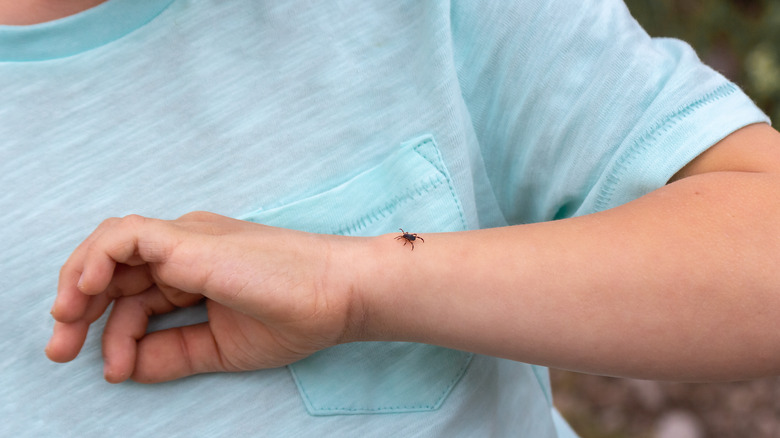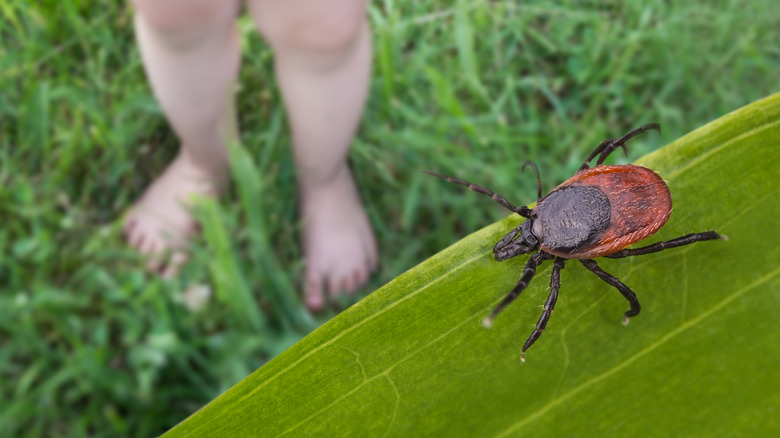Keep Hungry Ticks Away When Working In The Garden With This Repellant Clothing
Anytime you go on a great outdoor adventure or simply tend your garden, you need to prepare for the ticks. Those blood sucking little bugs love to lay in wait for an unsuspecting passerby. Since it can be impossible to spot them before they cling on, gardeners often wonder what they can do to prevent hitchhiking suckers. One way to do that is to wear light colored clothing. Dr. Jim Fredericks, a board certified entomologist and senior vice president of public affairs at the National Pest Management Association (NPMA) said that's a good way to spot them since the light color makes them more visible.
In an exclusive interview with House Digest, Fredericks explained that tick removal is important because of how dangerous they are. "They can transmit serious diseases to both humans and pets," he said. "These tiny arachnids can spread Lyme disease, the most common arthropod-transmitted disease in the U.S., as well as other tick-borne diseases like Rocky Mountain spotted fever, ehrlichiosis, anaplasmosis and babesiosis." What makes them especially concerning is how easy it is to not notice them, he added, which is why being able to see them quickly is important.
Prevention isn't just the key during tick season from May to September either, Fredericks explained. You should practice prevention all year, especially given how many different kinds of ticks there are nationwide, he noted. There are also steps you can take to keep ticks from taking over your lawn, too to reduce the likelihood of exposure.
Light clothes are just part of prevention
The American Hiking Society recommends wearing light colored clothing, suggesting dark clothing attracts more ticks. There's no clear scientific basis to support this — but entomologist Dr. Jim Fredericks suggests following the tip regardless since it'll make ticks that have hitched a ride more visible.
In an exclusive interview with House Digest, he also advised covering up. "When spending time outdoors, wear protective clothing, such as long pants, long-sleeved shirts and closed-toe shoes, especially in wooded areas or tall grasses," he suggested. Be sure to tuck your pants into your boots and socks if you can to stop them from crawling up your pant leg, Fredericks added.
You can also treat clothes with bug spray containing a minimum of 20% DEET and reapplying as needed, Fredericks said. As an alternative, lemongrass oil is also known to repel both ticks and fleas. If you still get bitten even with repellents, seek medical attention immediately, he added.
Keep yourself safe even in your own garden
Being in your own yard or garden isn't going to stop a tick from tagging along. Aside from personal prevention, you can also help make your space less hospitable for ticks. Dr. Jim Fredericks, in an exclusive interview with House Digest, said a few ways to do this is to "keep grass cut low and remove weeds, woodpiles and debris, which can attract ticks and other pests." You can also contact a pest professional to have them come out, inspect your property, tell you about the ticks they find (if they find any), and how to manage them, he added.
Even if you take all of the right steps though, always check yourself over thoroughly after your time outdoors — particularly if you're in tick-heavy areas, the entomologist advised. This may require a mirror, Fredericks said. "If they're able to latch on, ticks will try to find a warm, moist area of the body to attach and start feeding." He noted that some areas you may find them are the backs of the knees, around the waist, behind the ears, under the arms and armpits.


